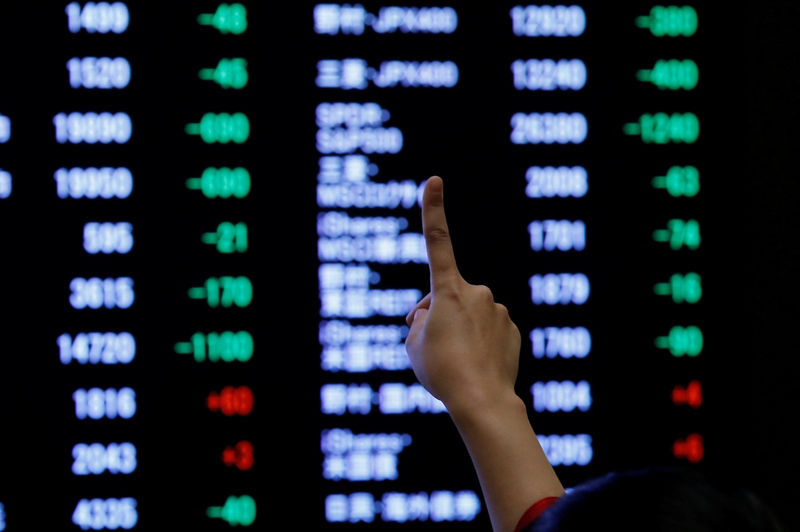 © Reuters. A woman points to an electronic board showing stock prices as she poses in front of the board after the New Year opening ceremony at the Tokyo Stock Exchange (TSE), held to wish for the success of Japan's stock market, in Tokyo
© Reuters. A woman points to an electronic board showing stock prices as she poses in front of the board after the New Year opening ceremony at the Tokyo Stock Exchange (TSE), held to wish for the success of Japan's stock market, in Tokyo
By Hideyuki Sano
TOKYO (Reuters) - Asian shares slumped on Thursday as the Hong Kong market was hit for the second straight session following a day of massive street protests, while oil prices flirted with five-month lows due to higher inventories and a bleak demand outlook.
Fading hopes that the United States and China will clinch a deal on the sidelines of a Group of 20 summit meeting in Osaka on June 28-29 also hurt sentiment and drove bond yields down.
"There's not even a plan of ministerial-level bilateral meetings ahead of the G20 summit. You can't expect any major agreement," said Hirokazu Kabeya, chief global strategist at Daiwa Securities.
European stock are expected to fall, with futures Britain's and Germany's down about 0.2%.
MSCI's broadest index of Asia-Pacific shares outside Japan fell as much as 1% and was last off 0.6%.
Hong Kong's tumbled 1.8% at one point following Wednesday's 1.7% fall.
The selling pressure in Hong Kong came after legislation that would allow citizens to be extradited to China triggered a mass protest and some of the worst unrest seen in the territory since Britain handed it back to Chinese rule in 1997.
Japan's lost 0.8% while U.S. stock futures slipped 0.2% in Asia, following small losses the previous day when the shed 0.20%.
Oil hovered near five-month lows, pressured by another unexpected rise in U.S. crude stockpiles, as well as the bleaker outlook for demand posed by prospects of a protracted trade war between China and the United States.
futures barely moved at $60.06 after a 3.7% slide on Wednesday to $59.97 a barrel, the international benchmark's lowest close since Jan. 28.
U.S. West Texas Intermediate crude futures stood at $51.12 per barrel, compared to the previous day's close of $50.72 a barrel, its weakest settlement since Jan. 14.
"It is a bit of mystery that oil prices are so low when global stock prices remain relatively supported. But one thing is certain. Weaker oil prices will curb inflation and boost rate cut expectations," said Daiwa's Kabeya.
Government data showed on Wednesday U.S. consumer prices barely rose in May, with the core annual inflation slowing to 2.0%, compared to a peak of 2.4% last July, adding to the growing expectations of a Federal Reserve rate cut in coming months.
Investors will be looking to what Fed policymakers will say after its next policy meeting on June 18-19, with Fed Funds rate futures pricing in a 25-basis-point rate cut for the subsequent policy review on July 30-31.
That is completely at odds with the Fed's projection three months ago, when policy makers saw gradual rate hikes in coming years.
"The U.S. real economy has not worsened that much. But given market expectations, the Fed will have no choice but to cut rates... It will take an action as an insurance against potential downside risks to the economy as a Sino-U.S. trade deal looks unlikely for now," said Kozo Koide, chief economist at Asset Management One.
The 10-year U.S. Treasuries yield dipped to 2.103 percent, near Friday's 2.053 percent, its lowest level since September 2017.
Bond yields also fell in Asia. Long-dated Japanese government bond yields hit their lowest levels since August 2016, with 20-year yield down 2.5 basis points at 0.220 percent, before they rose back on a weak 30-year bond auction.
In Australia, long known for its high-yield currency, rates fell to record lows, with three-year yield now slipping below 1 percent after the country's jobs data pointed to another interest rate cut in July to follow one just last week.
In the currency market, the yen gained 0.2% to 108.32 to the dollar as risk sentiment soured while the Australian dollar dropped 0.25% to $0.6910.
The euro stood little changed at $1.1293, having taken a hit on Wednesday after U.S. President Donald Trump said he was considering sanctions over Russia's Nord Stream 2 pipeline project and warned Germany against being dependent on Russia for energy.
The British pound is on the back foot after British lawmakers defeated an attempt led by the opposition Labour Party to try to block a no-deal Brexit by seizing control of the parliamentary agenda from the government.
Sterling fetched $1.2688, not far from this week's low of $1.2653.
https://www.investing.com/news/stock-market-news/hong-kong-leads-asian-stocks-lower-oil-near-fivemonth-lows-1896225
2019-06-13 08:05:00Z
52780313234077
Tidak ada komentar:
Posting Komentar